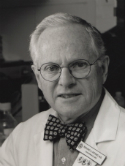Inducing differentiation of transformed cells with hybrid polar compounds: A cell cycle-dependent process Journal Article
| Authors: | Marks, P. A.; Richon, V. M.; Kiyokawa, H.; Rifkind, R. A. |
| Article Title: | Inducing differentiation of transformed cells with hybrid polar compounds: A cell cycle-dependent process |
| Abstract: | Transformed cells do not necessarily lose their capacity to differentiate. Various agents can induce many types of neoplastic cells to terminal differentiation. Among such inducers, a particularly potent group consists of hybrid polar compounds; hexamethylene bisacetamide (HMBA) is the prototype of this group. With virus-transformed murine erythroleukemia cells as a model, HMBA was shown to cause these cells to arrest in G1 phase and express globin genes. This review focuses on HMBA-induced modulation of factors regulating G1-to-S phase progression, including a decrease in the G1 cyclin-dependent kinase cdk4, associated with inhibition of phosphorylation of the retinoblastoma protein pRB and possibly other related proteins that, in turn, sequester factors required for initiation of DNA synthesis; this provides a possible mechanism for HMBA-induced terminal cell division. Evidence that hybrid polar compounds have therapeutic potential for cancer treatment will also be reviewed. |
| Keywords: | clinical article; protein phosphorylation; acute granulocytic leukemia; human cell; clinical trial; review; nonhuman; antineoplastic agents; dna synthesis; animal cell; mouse; animal; mice; cell cycle; cell division; phase 2 clinical trial; gene expression; thrombocytopenia; transcription factor; cell differentiation; tumor cells, cultured; structure-activity relationship; cancer therapy; animalia; myelodysplastic syndrome; dna; cell transformation; globin; globin gene; murinae; cell line, transformed; protein kinase c; phase 1 clinical trial; cycline; cyclin-dependent kinases; cyclins; retinoblastoma protein; clinical trials; phorbol 13 acetate 12 myristate; leukemia, erythroblastic, acute; hexamethylenebisacetamide; acetamides; human; priority journal; support, non-u.s. gov't; support, u.s. gov't, p.h.s.; erythroleukemia cell; elongation factor 2 |
| Journal Title: | Proceedings of the National Academy of Sciences of the United States of America |
| Volume: | 91 |
| Issue: | 22 |
| ISSN: | 0027-8424 |
| Publisher: | National Academy of Sciences |
| Date Published: | 1994-10-25 |
| Start Page: | 10251 |
| End Page: | 10254 |
| Language: | English |
| DOI: | 10.1073/pnas.91.22.10251 |
| PUBMED: | 7937935 |
| PROVIDER: | scopus |
| PMCID: | PMC44997 |
| DOI/URL: | |
| Notes: | Source: Scopus |
Altmetric
Citation Impact
BMJ Impact Analytics
Related MSK Work







